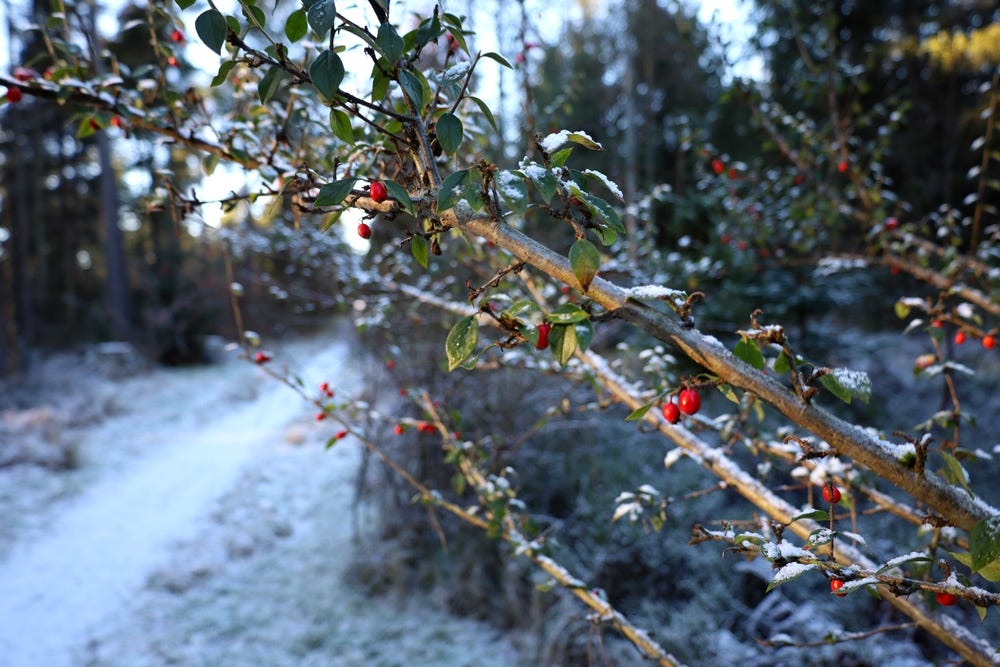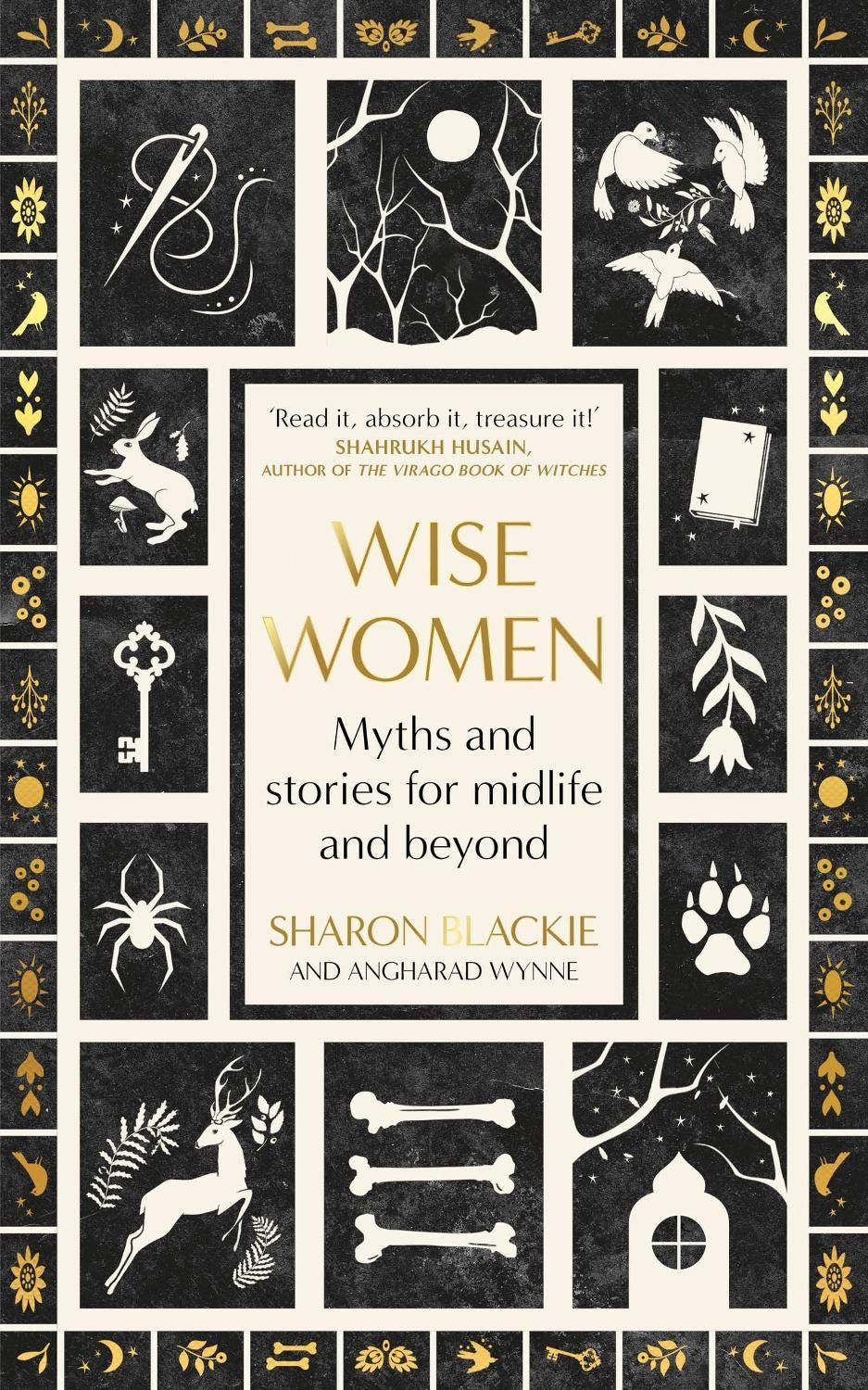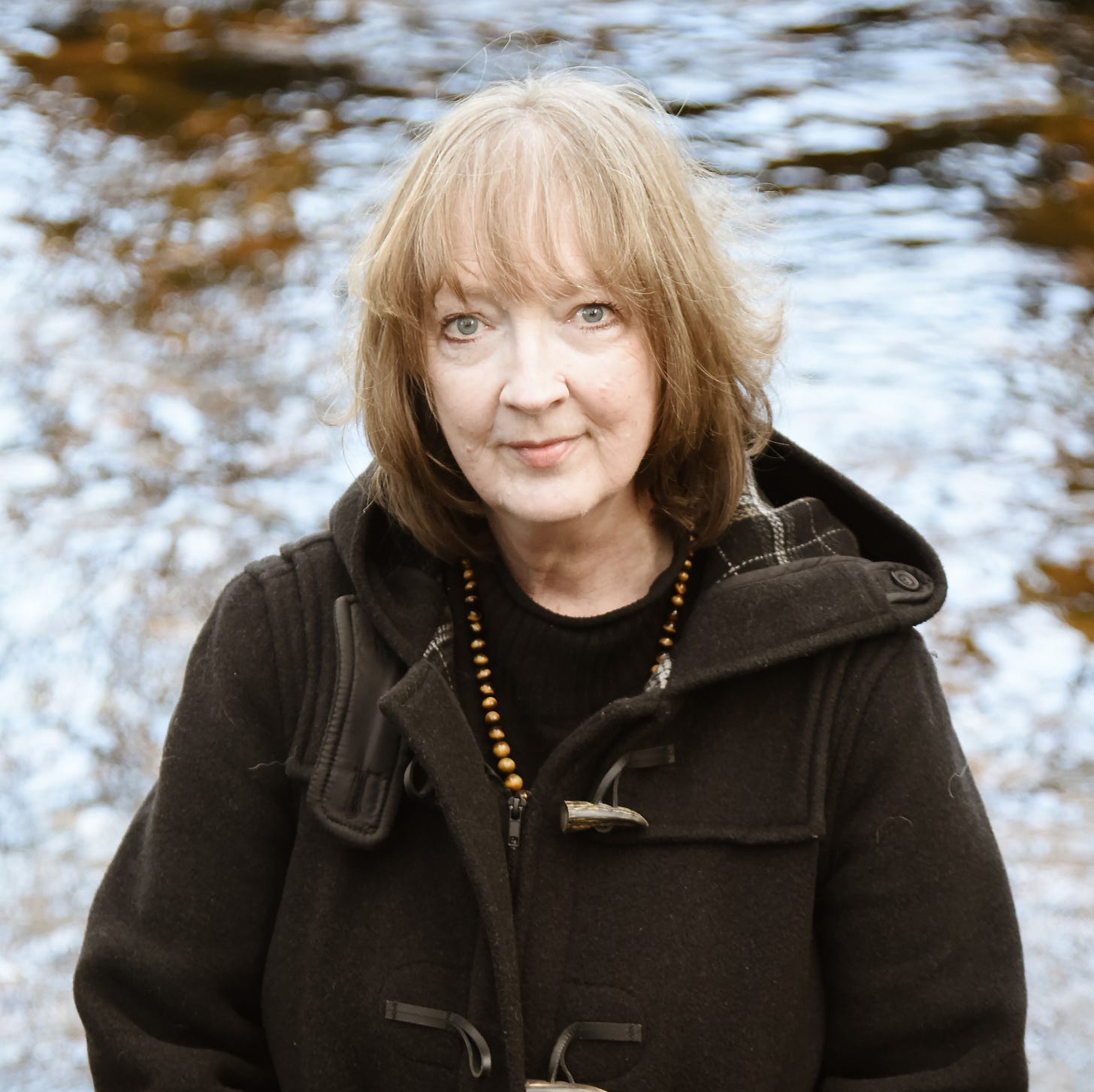Wintering is currently #1 in the UK chart! But for a while there, I thought it wasn’t; funny story… • I now have an online course called The Way Through Winter course, aimed at people who’d like to delve deeper and more creatively into their wintering experience • Listen to me on the Makers & Mystics podcast
Scroll down for:
An excerpt from Sharon’s new book, Wise Women
All week, I’ve been trying to repot a plant, but every time I mean to go to the shed to get some compost and grit, I realise it’s dark. It feels like this has happened very suddenly, although of course it has not. We are just a few weeks away from the midwinter solstice. The darkest days are upon us.
It all starts here, the beginning of the end. The frosts have finally come, feathering my windscreen in the morning, highlighting the edge of each leaf that mulches the garden. Our winter coats are down from the loft, the thicker duvet on the bed. The whole world feels tucked-in, swaddled, fitful in its sleep. We watch expectantly over it, anxious midwives of the world to come.
There is much to do. I try to resist the business of December, but I am not an island. This is the time of year when I feel the most sociable, prone to rustling up meals and cakes, inviting old friends over. Winter is a time for restored connections, everyone huddled together; for tales to be retold. There is a fluency between ourselves and the darkness, an understanding of the short wire between laughter and tears. All are welcome here. This is the realest point in the year.
This morning, I went walking in the woods, seizing my chance in a rare let-up from rain and wind. In my absence, the last of the leaves had fallen and the trees were bare. Suddenly, the woods were a different shape. It was hard to tell where the paths led; I kept diverting off between the trees. The silver birches looked white and ghostly; the holly suddenly proud; trunks of young oak shone like bronze. Further along, some of the trees had been cut down - there’s an effort locally to thin the vegetation in an effort to encourage more biodiversity. It looked so brutal, so desolate. But soon I found trimmings of holly and pine scattered around my feet, so I gathered them up and brought them home.
I have not yet put up my decorations, but mainly through lack of time. I don’t hold with those who believe in delaying the hanging of string lights and garlands. The earlier the better, I say. Light up the streets in defiance of the dark! Make our homes sparkle and glow! Winter may be an austere time, but there’s no need to be puritanical about it.
This year, as ever, I’m convinced that I have an extra stash of decorations hidden somewhere, which I have not yet found. This has been going on for quite a few years now. I’m sure there’s a wreath of glossy red berries somewhere, and a set of gold painted baubles. H says there is absolutely nowhere else they could be, and maybe I’d like to go into the loft myself and check? I will have to take his word for it, because I am no friend of ladders. In any case, the dog is in a cone after a cruciate ligament repair, and so we’re giving up on the idea of a tree. She’s already crashing into everything; I can’t face any more chaos.
So the evergreens I rescued from the woods will get hung up instead, tied with the ribbons I hoard (I keep all my used wrapping paper too, and buttons; this is why the loft is so terrifying). This month is all about keeping, squirrelling away life’s little necessities in case of a downturn. It can feel a little like the only way to balance out the flow of money and energy, the relentlessness of it all: we make our habitual economies so that we can be generous in other areas. Somewhere, we hope, a balance is found.
I wrote last year about keeping the long midwinter instead of concentrating all our festivities into one, stressful day - read it here.
This Month at The Clearing
We’re maybe all feeling the weight of the holiday rush already, but I hope I can offer some moments to pause. We have Creative Questions tonight, and then our monthly book club next week - a little earlier in the month than usual, but it’s that time of year! Our guest is Sharon Blackie, talking about Wise Women, which I know is already beloved by many of you. There’s a brief reading guide below.
Finally, there’s also our special December readalong of The Children of Green Knowe - there are more details here. Do join us!
You may notice that we haven’t added details of the events after January - that’s because we’re going to be making a few changes for the New Year. Watch this space for more detail, but there will be an enriched Book Club (much better, in my opinion), and a new podcast to enjoy. I’m always looking for ways to make this place better, without it all feeling overwhelming. I hope you’ll enjoy the refreshed offering!
December Book Club: Sharon Blackie’s Wise Women: Myths and Stories for Midlife and Beyond
We know how much you all love Sharon Blackie, so we’re thrilled to have her back for this month’s Book Club, talking about her latest book, Wise Women. Paid subscribers can find log-on details at the bottom of this post.
It’s a collection of stories about older women from European folklore, aimed at challenging the idea that this is an unimportant time of life, and instead drawing on the wisdom, beauty, experience and cunning of our elders. As Sharon puts it: “The primary purpose of this collection is to re-enchant a time of life which can seem dreary, and which most of us approach with trepidation. In spite of the evident challenges of midlife, menopause and the decades which follow, more and more mature women today are looking for ways to reimagine and reclaim the power of the second half of life. We’re all looking to become Wise Women, each in our own unique way. This book remembers the beautiful, lost fragments of our rich European traditions, and offers ideas for reweaving them into the fabric of a more meaningful and exhilarating everyday.”
These women are not to be messed with. They outwit monsters, test and mentor younger heroines, embody the cycles and seasons of the earth, weave the world into being – and almost always have the last laugh.
This is such a wonderful book with which to close the year - we can’t wait!
We have an exclusive extract from Wise Women below.
Wise Women: an excerpt
We are narrative creatures, hardwired for story. We make sense of the world, from childhood onwards, through the stories we find – or the stories that find us. They are the stars we navigate by; they bring us the wisdom we need to thrive. Always share your porridge with the hungry mice who know how to sort the wheat from the chaff. Whenever you’re invited, be sure to kiss the frog. Don’t insist on being a princess if you’re really a mermaid. Never slip out of your skin and leave it unattended.
An abundance of fairy tales shows us how beautiful goose girls and golden-haired princesses can find their way in the world – but what about older women? We too have a deep thirst for stories that illustrate ways in which we might live richly and meaningfully, but at first glance there would seem to be a dearth of inspiring characters to serve as role models for the second half of our lives. In the better-known stories – ‘Rapunzel’, ‘Hansel and Gretel’, ‘Snow White’ and many more – we’re presented with older women who are malevolent witches, who are jealous tyrants, or who are easily outwitted by any handsome young prince who happens along. Material across European folklore reflects a fundamental distrust of women as we age, and so a German proverb warns that If the devil can’t come himself, he sends an old woman, and another that “He who walks between two old women early in the morning will have only bad luck for the rest of the day.”
There’s certainly no positive, coherent image of female elderhood in contemporary Western culture – or at least, not one that any of us might want to inhabit. Although, throughout ancient European mythology, women have always personified wisdom – think of Sophia, Athena, Minerva, Metis – older women today are often ignored, encouraged to stay out of the way, or held up as objects of ridicule. The Wise Woman, symbolising the essence of mature female wisdom, is no longer a prominent archetype in our culture.
As I stood, hot-flushed and frantic, on the threshold of menopause just over a decade ago, all the cultural signposts seemed to be pointing in the direction of an end to my useful life. The good bits of my story were over, it seemed; now was the time to resign myself to its long, grey ending. I wasn’t having any of that; I’m a psychologist who believes that the essence of life is transformation, and I’d long specialised in all the ways in which story can transform us and how we might find ourselves in fairy tales. The outward-focused narrative of the first half of my life might be drawing to a close, but I was looking for a new narrative to illuminate the second half.
I was determined that this ending would be followed by a new beginning. And so, though no longer your typical fairy- tale heroine, I set out on a quest through the dark woods of European folklore to look for stories about women like me: older women who refused to be redundant and irrelevant, and who were searching for ways to reimagine the second half of their lives.
During years of obsessive excavation, ever-growing piles of musty, beautifully illustrated old fairy-tale collections and folklore monographs tottered precariously on my desk while I searched through them for lost and hidden gems. Much to my delight, I unearthed a surprising number of stories populated by old women who hold the protagonist’s fate in the palm of their gnarly old hands, who see the bigger picture (and probably were the ones who painted it in the first place), or who have the last laugh. The motivation for this book was, by gathering this folklore together for the first time, to bring back to life the funny and feisty ageing women who have been so thoroughly forgotten. My hope is that this rich and diverse collection of characters will offer insight into the ways that each of us could uniquely embody a bold and purposeful elderhood. Stories like this are important, because the way in which we think about who we are depends on the stories we tell about who we are. How we think about women in the second half of their lives depends on the images we hold of them – and if the stories we tell about older women and the images we hold of them are dysfunctional, then our elderhood will be dysfunctional too. If the contemporary cultural mythology suggests that older women serve no purpose then, quite simply, we need to change that mythology. It’s long past time to take control of and tell our own stories – and, for that purpose, we need tales in which we can shine. The stories that are retold in this book, based on originals scattered throughout several European traditions, are stories in which older women positively dazzle. In bringing together these ungainly giantesses, glamorous fairy godmothers, misunderstood witches, fierce grandmothers and perspicacious wise women, my aim was both to challenge and change the current cultural discourse around ageing – to help older women to transform themselves, and to live and tell their own stories in their own unique way.
Keep reading with a 7-day free trial
Subscribe to The Clearing by Katherine May to keep reading this post and get 7 days of free access to the full post archives.








